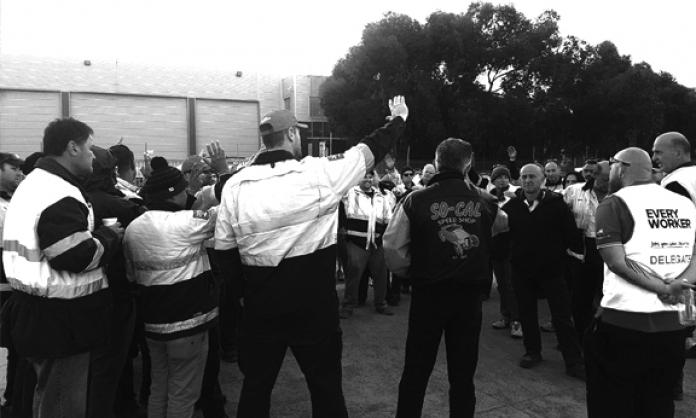After 16 hours of determined strike action against multinational giant Linfox, around 100 truck drivers in Melbourne’s west forced the company to reinstate an unfairly stood down workmate. Most of the drivers are members of the National Union of Workers.
Linfox, the largest logistics and supply chain company in the Asia Pacific region, had initiated serious disciplinary action against one of its drivers after accusing him of having a mobile phone out while driving. The company pushed ahead with the disciplinary charge despite the worker’s insistence that he was taking out his glasses case and camera footage taken from his truck cabin being deemed inconclusive after an investigation.
The decision to stand him down sparked outrage among workmates at the Altona North bulk petrol truck yard, where he worked. Disgruntlement about the use of cabin camera footage has been growing since the cameras were introduced around two years ago. Drivers reported that management routinely use the footage to harass and discipline them over fabricated and trivial matters.
Linfox also recently launched a major attack on drivers’ wages by trying to avoid paying wage increases due under the company’s enterprise agreement. Linfox – owned by trucking magnate Lindsay Fox – claims that drivers’ wages are too high. Fox, a multi-billionaire who is notoriously embroiled in a long-time battle to claim ownership of a whole swathe of public beach near his Melbourne mansion, wants his drivers’ wages frozen for the next two years.
At around 3pm on Tuesday, 20 September, a snap strike was called. Based on evidence from a site manager, Fair Work commissioner Gregory described the afternoon’s events in a “back to work” order issued late in the night.
“[The manager] noticed that a group of drivers due to start on the night shift were congregating at the gate and had not reported for the commencement of their shift. He said that he approached the drivers and asked them to commence work, however, none responded positively and they have remained outside the gate since this time.”
According to the drivers, the yard affected by the strike holds the trucks that deliver petrol to close 90 percent of all BP petrol stations and half of Shell stations in Victoria. It also carts jet fuel to Tullamarine airport. When the workers formed what the Fair Work Commission described as a “picket line outside the gate”, they were holding around 30 trucks parked inside the yard.
The workers’ key demands were for the reinstatement of their workmate, no repercussions for strikers and an end to camera surveillance being used to discipline them over trivial matters.
At around 11pm, news of the Fair Work Commission ceding the company’s request for an urgent “back to work” order reached the workers. It was personally delivered to them by a widely despised site manager who came to the gates and told workers that if the order was defied, the company would sue individuals participating in the action. Managers also claimed they would call the police in the morning to remove the workers forcefully if they were not back at work by then.
While the company marshalled its best efforts to intimidate its workforce, it overplayed its hand and instead ensured the workers were more determined to hold their ground. With each passing hour that the fleet sat in the yard, all sides knew that it was the company on which the pressure was mounting quickly. One driver pointed out that, on any other day, the yard would be empty, with all the loaded trucks dispersed across Victoria delivering petrol.
Both the company and the workers also knew well that the company wouldn’t easily be able to bring scabs in to break the deadlock. “You can’t just grab any monkey off the street and throw them in one of these trucks”, said one driver, referring to specific licence requirements and lengthy site inductions all drivers are subject to before they can transport petrol, which is classified as a dangerous good.
Early Wednesday morning, while the workers were celebrating the strike’s 16th hour, they received notice that the stood down driver had been reinstated with only a warning. It was rumoured that BP and Shell had pushed Linfox to negotiate with the workers in order to get the fuel moving again because at least one station was already running dry.
The drivers went back to work, spirits high, claiming a partial but significant victory against a company with a hard reputation. In a predominantly white workforce, there was no hesitation in walking out and staying out in solidarity with a truck driver from an Indian background. Many of the workers will be given a warning for participating in the action but they walked back in the gates having given the company a major shock. The outstanding issues relating to the use of cabin cameras will be fought out in the coming months.
Learn more at Socialist Alternative’s Union Activism and History Conference: Saturday 15 October, Trades Hall, Carlton South. www.redflag.org.au/unionconf.










